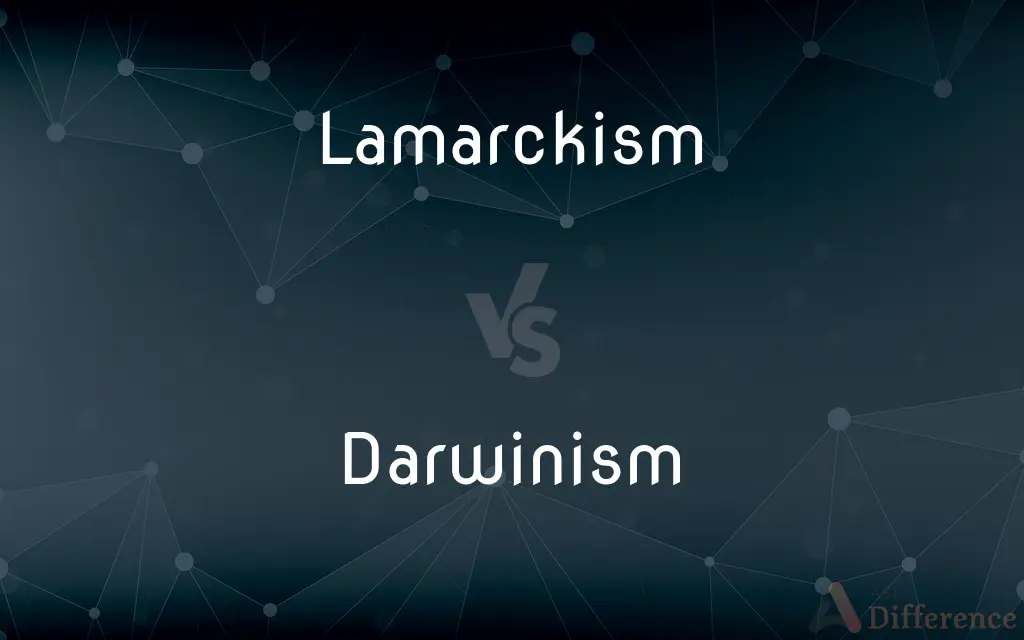Lamarckism vs. Darwinism — What's the Difference?
By Tayyaba Rehman — Updated on September 28, 2023
Lamarckism proposes species evolve through acquired traits during an individual's lifetime. Darwinism posits natural selection drives evolution based on hereditary variations.

Difference Between Lamarckism and Darwinism
Table of Contents
ADVERTISEMENT
Key Differences
Lamarckism and Darwinism are both theories that seek to explain the mechanism behind the evolution of species. Lamarckism, named after Jean-Baptiste Lamarck, suggests that organisms can change during their lifetimes in response to their environment, and these changes are passed on to their offspring. Darwinism, stemming from the ideas of Charles Darwin, argues that species evolve over generations through the process of natural selection.
A fundamental tenet of Lamarckism is the concept of "use and disuse." It proposes that if an organism uses a particular organ or trait frequently, it would become more developed, and if it's unused, it would atrophy. Over time, these acquired characteristics would be passed on to subsequent generations. Darwinism, however, emphasizes the role of hereditary variations and how they confer survival advantages to organisms in a given environment.
While Lamarckism focuses on the individual's ability to adapt and pass on those adaptations, Darwinism considers the population as a whole. In Darwin's view, individual organisms possess variations, and those with beneficial variations are more likely to survive, reproduce, and pass on their traits to the next generation. Over time, this leads to the evolution of species.
Over the years, Lamarckism has faced significant criticism, primarily because modern genetics has shown that acquired traits aren't typically passed on to offspring. Darwinism, with the principles of natural selection and heredity, has garnered more empirical support and is foundational to modern evolutionary biology.
In essence, while both Lamarckism and Darwinism address evolution, their mechanisms and foundational principles are distinct. Lamarckism centers on acquired traits and their inheritance, while Darwinism is rooted in natural selection acting on hereditary variations.
ADVERTISEMENT
Comparison Chart
Originator
Jean-Baptiste Lamarck
Charles Darwin
Key Mechanism
Acquired traits during an individual's lifetime
Natural selection based on hereditary variations
Focus
Individual adaptations
Population-based variations
Genetic Basis
Acquired traits passed to offspring
Inherited traits determine survival advantages
Modern Acceptance
Largely discredited by modern biology
Widely accepted and foundational to evolutionary biology
Compare with Definitions
Lamarckism
An evolutionary idea focusing on use and disuse of traits.
Lamarckism suggests that if a giraffe stretches its neck, the next generation will have longer necks.
Darwinism
An evolutionary concept based on survival of the fittest.
According to Darwinism, organisms best suited to their environment are more likely to reproduce.
Lamarckism
A biological concept proposing environmental changes directly impact species evolution.
Through Lamarckism, it was believed that a blacksmith's muscular arm would be inherited by his offspring.
Darwinism
A foundational principle in modern evolutionary biology.
Darwinism, supported by genetic evidence, is widely accepted in the scientific community.
Lamarckism
A theory of evolution based on the inheritance of acquired traits.
Lamarckism was one of the early attempts to explain the mechanism behind evolutionary changes.
Darwinism
A theory of evolution emphasizing natural selection.
Darwinism revolutionized the scientific understanding of species' development over time.
Lamarckism
An outdated evolutionary theory predating modern genetics.
Despite its historical significance, Lamarckism is not supported by current scientific understanding.
Darwinism
The idea that species evolve through inherited trait variations.
Darwinism suggests that over generations, advantageous traits become more prevalent in populations.
Lamarckism
A perspective emphasizing direct adaptation and trait inheritance.
Lamarckism presented a contrasting view to Darwin's idea of natural selection.
Darwinism
An evolutionary perspective considering population-based variations.
Darwinism focuses on how hereditary variations within populations lead to evolutionary changes.
Lamarckism
Lamarckism, also known as Lamarckian inheritance or neo-Lamarckism, is the notion that an organism can pass on to its offspring physical characteristics that the parent organism acquired through use or disuse during its lifetime. It is also called the inheritance of acquired characteristics or more recently soft inheritance.
Darwinism
Darwinism is a theory of biological evolution developed by the English naturalist Charles Darwin (1809–1882) and others, stating that all species of organisms arise and develop through the natural selection of small, inherited variations that increase the individual's ability to compete, survive, and reproduce. Also called Darwinian theory, it originally included the broad concepts of transmutation of species or of evolution which gained general scientific acceptance after Darwin published On the Origin of Species in 1859, including concepts which predated Darwin's theories.
Lamarckism
A theory of biological evolution holding that the changes occurring in an organism through use and disuse of its body parts in response to environmental change are inherited by its offspring.
Darwinism
A theory of biological evolution developed by Charles Darwin and others, stating that all species of organisms have developed from other species, primarily through natural selection. Also called Darwinian theory.
Lamarckism
The theory that structural variations, characteristic of species and genera, are produced in animals and plants by the direct influence of physical environments, and esp., in the case of animals, by effort, or by use or disuse of certain organs. It is a discredited theory, not believed by modern biologists.
Darwinism
Alternative case form of Darwinism.
Lamarckism
A theory of organic evolution claiming that acquired characteristics are transmitted to offspring
Darwinism
The theory or doctrines put forth by Darwin. See above.
Darwinism
A theory of organic evolution claiming that new species arise and are perpetuated by natural selection
Common Curiosities
Which theory is more widely accepted today, Lamarckism or Darwinism?
Darwinism is more widely accepted in modern science.
Is Lamarckism still taught in modern biology courses?
While Lamarckism is largely discredited, it's often taught in historical contexts of evolutionary thought.
Did Lamarck believe in the inheritance of acquired traits?
Yes, Lamarckism is based on the idea that acquired traits can be passed to offspring.
How does Darwinism explain the survival of certain traits in populations?
Darwinism proposes that traits offering survival advantages lead to greater reproductive success.
Which theory, Lamarckism or Darwinism, incorporates the idea of "use and disuse"?
The idea of "use and disuse" is associated with Lamarckism.
What is the primary mechanism of evolution in Darwinism?
The primary mechanism in Darwinism is natural selection based on hereditary variations.
Did Jean-Baptiste Lamarck and Charles Darwin ever collaborate?
No, their works and theories were developed independently.
Is the concept of "survival of the fittest" part of Darwinism?
Yes, "survival of the fittest" is a phrase often linked to Darwinism and natural selection.
Share Your Discovery

Previous Comparison
Armory vs. Armoury
Next Comparison
Melon vs. HoneydewAuthor Spotlight
Written by
Tayyaba RehmanTayyaba Rehman is a distinguished writer, currently serving as a primary contributor to askdifference.com. As a researcher in semantics and etymology, Tayyaba's passion for the complexity of languages and their distinctions has found a perfect home on the platform. Tayyaba delves into the intricacies of language, distinguishing between commonly confused words and phrases, thereby providing clarity for readers worldwide.













































